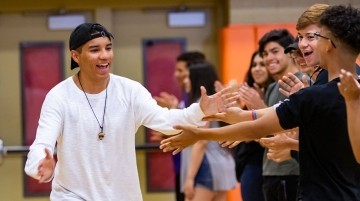Social Justice Humanitas Academy (SJ Humanitas)—a public high school located in Southern California’s San Fernando Valley—was designed and founded by teachers as a community school in 2011. Their vision, which they actualized with partners through the Los Angeles Unified School District (LAUSD) Pilot School initiative, was to create a school that would “not only be a place of learning, but also a resource for the community.” To do so, they designed a school that would bring together community resources, incorporate collaborative structures, and support students on their pathways to postsecondary success and self-actualization.
Since its inception, SJ Humanitas has supported the success of its distinct student population. Currently, SJ Humanitas serves 521 students, 96% of whom are Latino/a and 7% of whom are identified as English learners. Ninety-three percent of its students are identified as economically disadvantaged, which represents a larger percentage than the district average. Despite serving a more disadvantaged population, SJ Humanitas outperforms its counterparts in LAUSD on a number of measures: 97% of SJ Humanitas students graduated from high school, compared to 82% in the district, and 95% of SJ Humanitas students completed the course sequence required for eligibility to California’s public university system, which nearly doubled the district rate. On the state’s Common Core–aligned state assessment, 72% of SJ Humanitas students met or exceeded standards for English language arts, compared to the district average of 53% of high school students. In addition, survey data suggest that SJ Humanitas students hold a range of important mind sets and habits, such as holding a growth mindset, feeling connected to school, and being socially aware and self-efficacious, at higher rates than their peers in other district schools.
The structures and practices implemented at SJ Humanitas honor and nurture whole child development in ways that are supported by the science of learning and development.
Community schools, like SJ Humanitas, are increasingly elevated as an equity-driven, research-based approach that can address students’ holistic needs. Yet there is a common misperception that community schools primarily focus on the provision of external supports rather than influencing the character of teaching and learning to enable student success. That is, many perceive them as addressing factors that surround learning rather than influencing the very practices that characterize schooling environments and classrooms. This case study addresses this misconception, illustrating how SJ Humanitas implemented a range of whole child education practices to advance outcomes and support student well-being.
The structures and practices implemented at SJ Humanitas honor and nurture whole child development in ways that are supported by the science of learning and development. A recent synthesis of that research points to the importance of four sets of principles that leaders and educators can use to promote whole child learning and development that characterize the practices observed at SJ Humanitas:
- Supportive environments that promote strong attachments and relationships; a sense of physical and psychological safety and belonging; and connections among educators, school staff, and families.
- Social and emotional development to promote the skills, habits, and mindsets that enable self-regulation, interpersonal skills, and resilience, along with behavior supports that are educative and restorative.
- Productive instructional strategies that support motivation and engagement, build on children’s prior knowledge and experiences, and develop students’ ability to learn how to learn.
- Systems of supports that enable healthy development, meet student needs, and address learning barriers, including multi-tiered systems of support and expanded learning opportunities.
Social Justice Humanitas: A Community School Approach to Whole Child Education by Marisa Saunders, Lorea Martinez, Lisa Flook, and Laura E. Hernández is licensed under a Creative Commons Attribution-NonCommercial 4.0 International License.
This research was supported by the Chan Zuckerberg Initiative and the Stuart Foundation. Core operating support for the Learning Policy Institute is provided by the S. D. Bechtel, Jr. Foundation, Heising-Simons Foundation, William and Flora Hewlett Foundation, Raikes Foundation, and Sandler Foundation. We are grateful to them for their generous support. The ideas voiced here are those of the authors and not those of our funders.
Photo used with permission by Social Justice Humanitas Academy.
